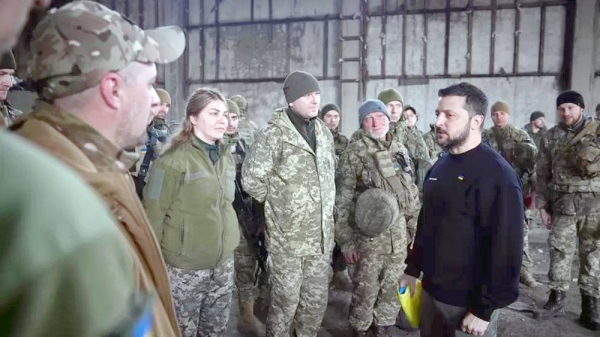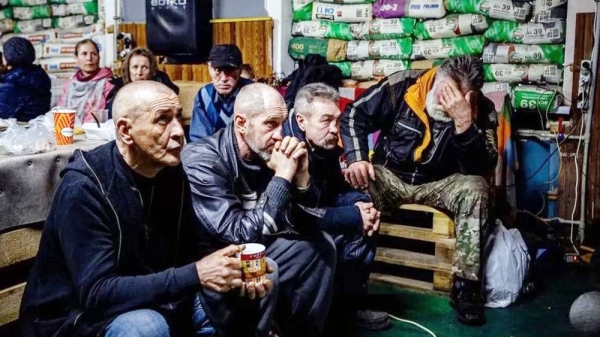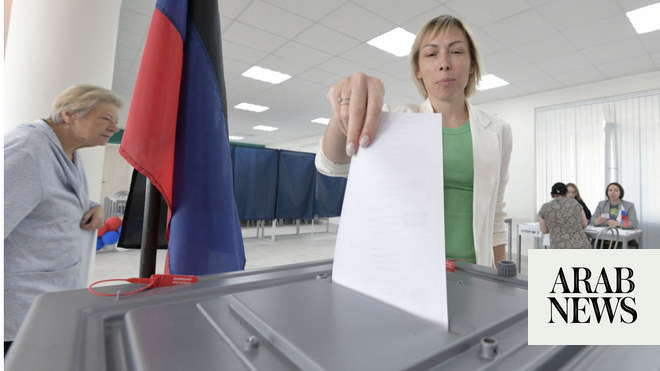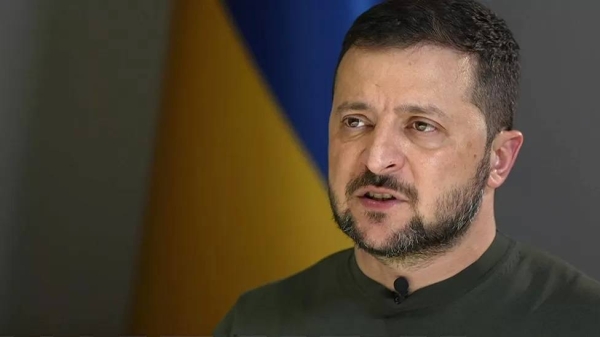
Ukraine’s President Volodymyr Zelensky on Tuesday visited Bakhmut, which has been at the epicenter of fierce fighting in recent weeks.
Earlier this month, he said Russian forces had turned the eastern Ukrainian city into ruins in trying to conquer it in recent months.
Zelensky’s office said the visit included meeting and chatting with military personnel.
Bakhmut remains in Ukrainian hands and has done for the almost 10-month war. The resistance has thwarted Moscow’s goal of capturing Donetsk province, part of the Donbas region bordering Russia.
Taking Bakhmut would rupture Ukraine’s supply lines and open a route for Russian forces to press on toward Kramatorsk and Sloviansk, which are key Ukrainian strongholds in the province.
Pro-Moscow separatists have controlled part of Donetsk and neighboring Luhansk province since 2014.
Meanwhile, electricity supplies in the Kyiv region were at a “critical” level on Tuesday, with less than half the capital’s power needs being supplied following Russian missile and drone attacks, regional officials said.
Regional governor Oleksiy Kuleba said 80% of the region was without electricity for a second day after Russian drones hit energy infrastructure around on Monday, the latest in a series of attacks on power facilities since October.
“The situation with electricity supplies remains critical,” Kuleba said on the Telegram messaging platform. “I want to stress that with every shelling by the enemy, the complexity and duration of the repairs increase.”
National power grid operator Ukrenergo said it could provide less than half the required consumption in the capital Kyiv. The capital’s subway system was briefly stopped during the morning rush hour because the electricity supply was unstable.
“Supplies to critical infrastructure are a priority. We expect that today we will be able to turn on equipment to enable the security of supplies to be increased, reduce the capacity deficit and connect more consumers,” Ukrenergo said.
If electricity is lost, water supplies, heating and mobile phone networks are usually affected. Kyiv Mayor Vitali Klitschko said the city had been able to restore water supplies to some consumers.
The United Nations has estimated that about 50% of Ukraine’s energy infrastructure has been destroyed since Russia stepped up its attacks on power facilities in October. Daily temperatures in Kyiv and the region at this time of year are below freezing.
In another development, Russia’s President Vladimir Putin admitted on Tuesday that the situation was “extremely difficult” in the four regions of southern and eastern Ukraine that Moscow annexed earlier this year.
“The situation in the People’s Republics of Donetsk, Luhansk, as well as in the Kherson and Zaporizhzhia regions is extremely difficult,” Putin said.
He was speaking in a video aimed at employees of the Federal Security Service (FSB), the Foreign Intelligence Service (SVR) and the Federal Protective Service (FSO) who celebrate their annual “professional holiday” on Dec. 20.
Putin praised the work of members of the Russian security services who operate in “the new regions of Russia”, assuring that “the people living there, Russian citizens” depend on the “protection” of these services.
Moscow’s land grab in September drew international condemnation. Kyiv accused Moscow of redrawing borders “using murder, blackmail, mistreatment and lies”.
Putin, himself a former agent of the Soviet secret service (KGB), also said in the video that counterintelligence services should be fully concentrated.
“It is necessary to severely repress the actions of foreign secret services and to effectively identify traitors, spies and saboteurs,” said Putin.
Also the Kyiv’s mayor makes Christmas pledge to children. “The Russians are trying to deprive our citizens of a normal life, but we won’t let them steal the biggest holidays — New Year and Christmas — from our children,” said Klitschko.
They were the words of Kyiv’s mayor as he unveiled a 12-meter-high artificial Christmas tree in the center of the Ukrainian capital.
A few dozen residents braved the freezing cold to admire the tree — which is next to Saint Sophia Cathedral and its famous golden domes — and take selfies.
According to Orthodox tradition, Ukrainians celebrate Christmas on Jan. 7, but polls show a growing number of people prefer to bring the date forward to Dec. 25, in line with other churches.
An Interfax-Ukraine poll shows support for the change has risen from 26% in 2021 to 44% in 2022.
Kyiv city authorities were initially reluctant to install the tree, said the mayor, referring to attacks by Russian forces that caused power cuts and exhausted the Ukrainian electricity grid in the midst of wintry weather conditions.
It saw Kyiv adapt. The fairy tree lights are powered by a diesel generator, and decorations from previous years are reused.
“We called it ‘the Christmas tree of Ukrainian invincibility’,” declared Klitschko, stressing that everything was done “so that the children have a holiday despite the difficult times”.
Also Ukraine continued to erase Russian influence from public spaces. As the war in Ukraine enters its tenth month, Kyiv is speeding up efforts to remove Soviet and Russian influence from its public spaces.
It has pulled down monuments and renamed hundreds of streets to honor its own artists, poets, soldiers, independence leaders and others — including heroes of the conflict since Moscow launched its full-scale invasion of Ukraine in February.
A bust of Alexander Pushkin — a giant of 19th-century Russian literature — was pulled down in the eastern city of Dnipro on Friday.
Earlier this month, Klitschko announced about 30 more streets in the Ukrainian capital will be rechristened.
Volodymyr Prokopiv, deputy head of the Kyiv City Council, said Ukraine’s “de-Communization” policy since 2015 had been applied in a “soft” way so as not to offend sensitivities among the country’s Russian-speaking and even pro-Moscow population.
“With the war, everything changed. Now the Russian lobby is now powerless — in fact, it doesn’t exist,” Prokopiv said in an interview with The Associated Press in his office overlooking Khreschatik Street, the capital’s main thoroughfare.
“Renaming these streets is like erasing the propaganda that the Soviet Union imposed on Ukraine.”
In its program, Kyiv conducted an online survey, and received 280,000 suggestions in a single day, Prokopiv said. Then, an expert group sifted through the responses, and municipal officials and street residents give a final stamp of approval.
Under the “de-Communization” program, about 200 streets were renamed in Kyiv before this year. In 2022 alone, that same number of streets have been renamed and another 100 are scheduled to get renamed soon, Prokopiv said.
A street named for philosopher Friedrich Engels will honor Ukrainian avant-garde poet Bohdan-Ihor Antonych.
A boulevard whose name translates as “Friendship of Peoples” — an allusion to the diverse ethnicities under the USSR — will honor Mykola Mikhnovsky, an early proponent of Ukrainian independence.
Another street recognizes the “Heroes of Mariupol” — fighters who held out for months against a devastating Russian campaign in that Sea of Azov port city that eventually fell.
A street named for the Russian city of Volgograd is now called Roman Ratushnyi Street in honor of a 24-year-old civic and environmental activist who was killed in the war.
A small street in northern Kyiv still bears Dostoevsky’s name but soon will be named for Warhol, the late Pop Art visionary from the United States whose parents had family roots in Slovakia, across Ukraine’s western border.
Valeriy Sholomitsky, who has lived on Dostoevsky Street for nearly 40 years, said he could go either way.
“We have under 20 houses here. That’s very few,” Sholomitsky said as he shoveled snow off the street in front of a fading address sign bearing the name of the Russian writer. He said Warhol was “our artist” — with heritage in eastern Europe.
Now, “it will be even better,” he said.
“Maybe it is right that we are changing many streets now because we used to name them incorrectly,” he added. — Euronews












